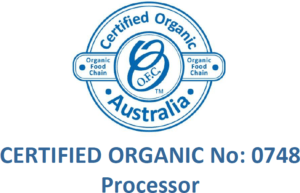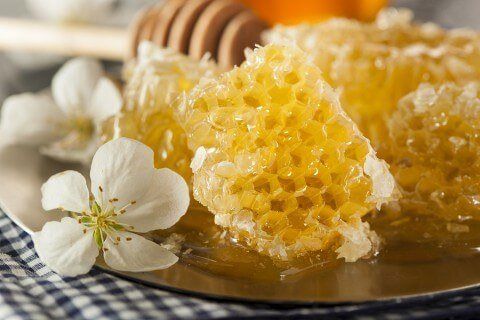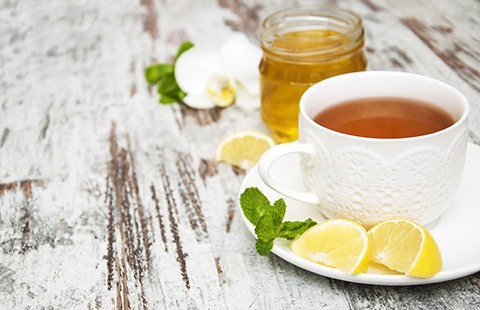Not all honeys are created equal, and telling the difference can sometimes be tricky. The standard honeys available at conventional supermarkets aren’t always as beneficial for our health as we’d like them to be. They are often highly processed and lacking in important nutrients.
Manuka honey, however, has been shown to have up to 4 times the nutritional content of normal flower honeys, and it is also highly antibacterial.
Honey has been used for thousands of years for medicinal purposes including topical treatment for wounds and other skin infections, but recent studies have exposed many more amazing health benefits of this unique honey.
Manuka Honey is so effective because of its considerably higher level of enzymes than regular honey. These enzymes create a natural hydrogen peroxide that works as an antibacterial. Hydrogen peroxide and methylglyoxal (MG), a powerful antibiotic compound, found in Manuka honey create what is referred to as the Unique Manuka Factor (UMF).
The UMF is a global standard in identifying and measuring the antibacterial strength of Manuka. This is necessary as UMF is not found in the nectar of all Manuka flowers, the flower native to New Zealand which is pollinated to create the Manuka honey. Two laboratories in New Zealand carry out independent tests in order to establish the UMF of certain Manuka honeys, that is, to identify the percentage of MG and therefore its concentration of healing properties.

Here is an explanation of what Manuka honey UMF you should use:
0-4 Non-therapeutic
4-9 Maintenance level with general honey health benefits
10-14 Supports natural healing and bacterial balance
15+ Superior levels of phenols that are highly therapeutic
Top Manuka Honey Benefits
Gastritis
Gastritis is the inflammation of the stomach lining and can be caused by bacterial infections. Manuka honey has been shown to be effective against Helicobacter pylori, the bacteria most commonly seen in the highly acidic environment of the stomach. This bacterium is implicated in most cases of stomach ulcers that develop into cancer.
SIBO, Low Stomach Acid, Acid Reflux
Manuka honey is very beneficial in reducing reflux and balancing your digestive system to heal stomach and intestinal imbalances.
Inflammatory Bowel Disease
Manuka honey has been found to be effective in preventing colonic inflammation. It also helps with the repair of the colon lining damaged due to chronic Inflammatory Bowel Disease (IBD).
Acne and Eczema
While there are no clinical trials to support claims that Manuka honey helps treat acne and eczema, there is plenty of anecdotal evidence from people applying honey on affected areas and seeing results. This makes sense due to Manuka’s proven antimicrobial and healing properties.
Staph Infections (MRSA)
UK researchers from Cardiff Metropolitan University have recently discovered that Manuka honey down-regulates the most potent genes of the MRSA bacteria. Some scientists have suggested that regular topical use on cuts and infections (especially in hospitals and nursing homes) may keep MRSA at bay naturally.
Burns and Wounds
Manuka honey is excellent at treating cuts and burns due to its rich antioxidant, antibacterial and anti-inflammatory properties. It disinfects the wound, draws out fluid and accelerates the body’s own defence mechanisms. Manuka also acts as pain relief for burn patients.
Dental Health
Inflammation of the gum (gingivitis) and the periodontal disease called pyorrhoea can be prevented or controlled by Manuka honey. Manuka has a high mineral content including calcium, zinc and phosphorous, and several studies have shown that chewing or sucking on a Manuka honey product caused a 35% decrease in plaque and led to a 35% reduction in bleeding sites in people suffering from gingivitis.
Immunity
Manuka honey can stimulate the body’s cytokine production and kickstart our defence mechanisms to better fight off pathogens and diseases.
Cough Remedy
Honey has traditionally been taken to soothe sore throats and stop coughs because it soothes the lining of the throat and decreases discomfort and irritation. Due to its high antimicrobial actions, Manuka honey is even more effective than regular honey, and it has recently been approved by the National Cancer Institute to be used to heal inflammation in the throat from chemotherapy.
Tonsillitis
Tonsillitis is a painful inflammation of the tonsils and Manuka honey has been shown to be an effective remedy. It’s recommended that a teaspoon of honey be taken 3-4 times a day to combat the infection and inflammation. It acts by destroying the pathogens and stimulating the body’s own defence system.
Allergies and Sinusitis
Taking Manuka honey on a regular basis can dramatically improve symptoms of allergy sufferers. It also helps those suffering from chronic sinusitis. Some people use Manuka honey in a neti pot to irrigate the sinuses, but intake of high grade (UMF 15+) could be just as effective.
Athlete’s Foot and Ringworm
Two of the most common fungal infections of the skin are athlete’s foot and ringworm. Applying honey to the affected area will relieve the itch and help clear the infection, making Manuka honey an effective treatment.
How to Use Manuka Honey
You can add Manuka honey to your favourite herbal tea or to meals, or you can just take it straight. It’s recommended that you take a dose of about 1-2 tablespoons per day for the most benefit.
Precautions
Some sources claim that people allergic to bees, pollen or other bee-related allergies should use Manuka honey with caution due to possible allergic side effects.
Any kind of honey isn’t suitable for babies under 12 months of age.
TMP Organics has a range of Manuka Honeys in store. Come on in this weekend!




